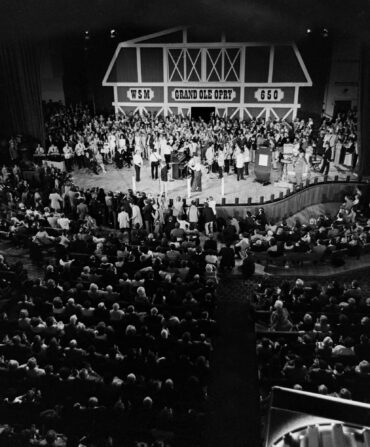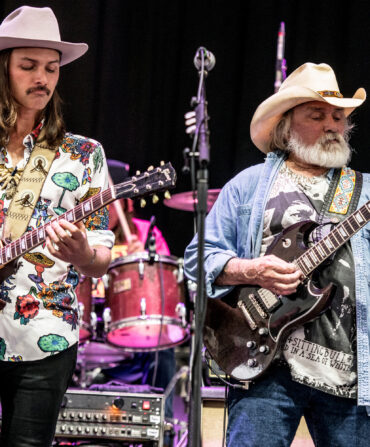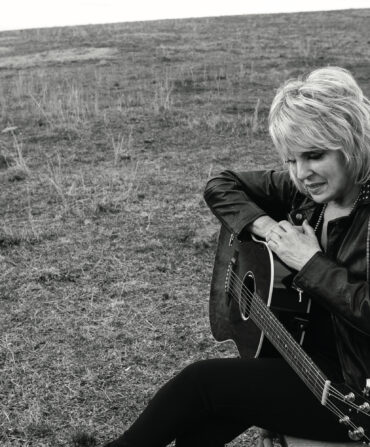Music
The String-Scorching, Soul-Baring Power of Molly Tuttle
Overcoming years of insecurity and doubt, the electrifying guitar virtuoso is putting out her boldest bluegrass yet
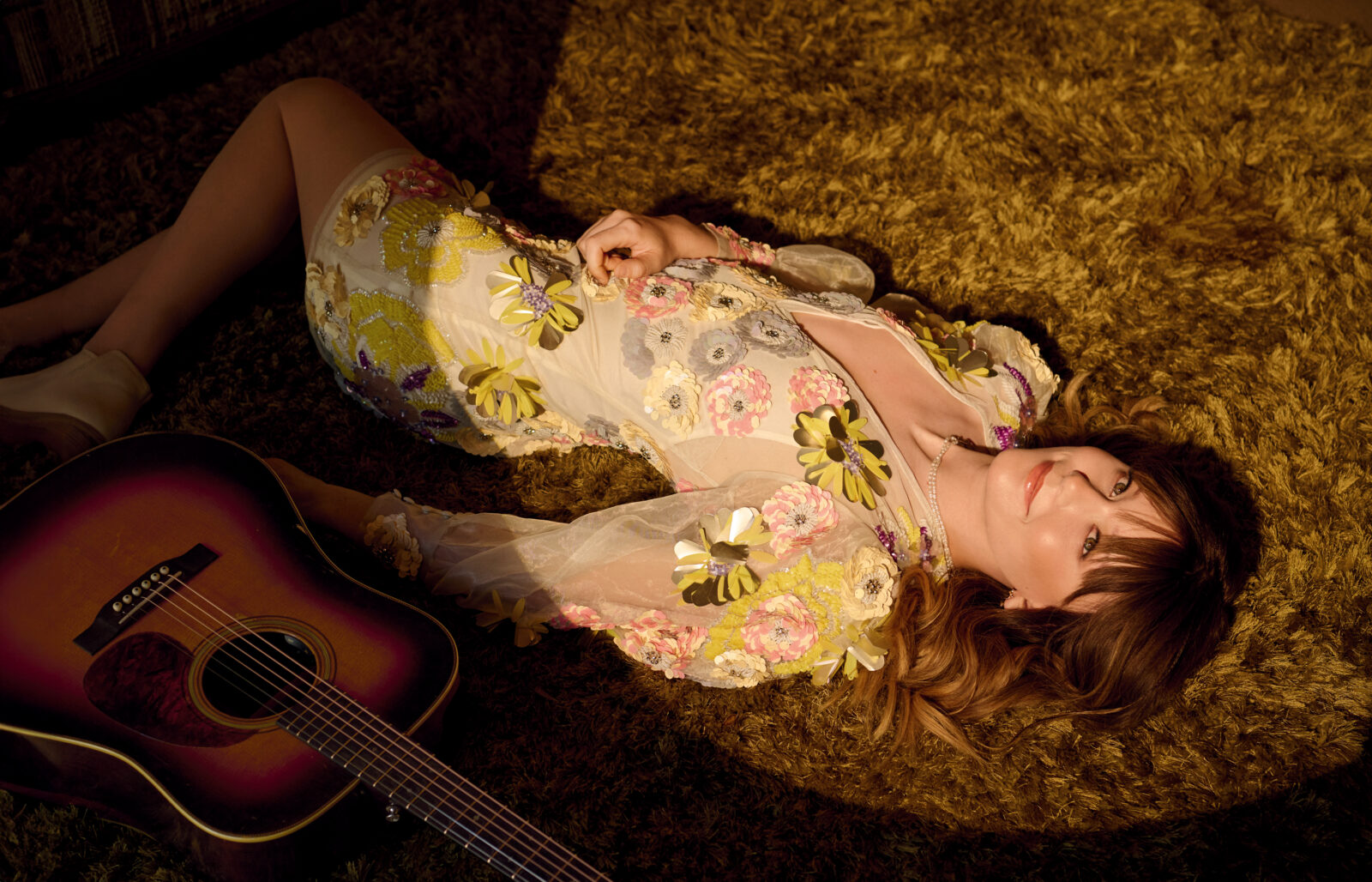
Photo: PETER YANG
Tuttle, photographed with her Pre-War Guitars Co. dreadnought between tour stops in Paradise Valley, Arizona.
It’s a warm April night outside of Charlotte, and I’m sprawling on a blanket in a forest of camp chairs. Tie-dye abounds. So does plaid. A bubble machine is churning away valiantly near the stage, and every few minutes, a plume of illicit combustibles rises from the folks down front. There are dogs and strollers and guys twirling batons. No one here can dance, but no one lets that stop them.
This is Tuck Fest, three days of live music at the U.S. National Whitewater Center, where the world’s largest man-made whitewater river ferries kayakers through the venue and zip-liners fly past overhead. When you come to an adventurers’ playground like this, the buzzy commotion is kind of the point. But a little after 9:00 p.m., a reverent hush sweeps the field. Molly Tuttle, one of the world’s best bluegrass guitar players, has just taken the stage.

At thirty-one, Tuttle is tall and willowy in a wide-brimmed hat and gauzy kimono, with caramel-colored hair that falls past her shoulders. The sweetness of her voice has a defiant, haunting edge. “Never let them hold us down,” she sings in the lively, banjo-forward “Evergreen, OK,” “or try to fence us in.”
Tuttle and her four-piece band, Golden Highway, are headlining their own Down the Rabbit Hole tour. Their latest album, City of Gold, which Tuttle cowrote with Ketch Secor of Old Crow Medicine Show, follows two themes that seem as though they couldn’t possibly intersect, yet somehow they do. One honors the history and landscape of Tuttle’s home state, California, with tracks like “San Joaquin” and “Yosemite.” The other is a semipsychedelic reimagining of Alice’s Adventures in Wonderland, as though Lewis Carroll had stumbled into backwoods Kentucky.
Watching Tuttle’s hands fly along the fretboard of her Pre-War dreadnought guitar is like observing a hummingbird’s wingbeats: They’re just a blur. She can play in almost any style, from classical to clawhammer, though her specialty is lightning-fast bluegrass flat-picking. By the end of the night, her fingers’ furious activity will have dulled her guitar’s bronze strings, which are replaced at least every two shows, if not every night. From the shoulders up, however, you wouldn’t know Tuttle was playing at all; that’s how relaxed she is. How confident.
But “she’s not a braggadocio,” clarifies the Dobro legend Jerry Douglas when I ask him about coproducing her last two records, both of which won Grammys, in 2022 and 2023, for Bluegrass Album of the Year. “She’s not somebody who blows her own horn about it. She just shows you.”
Over the past five years, Tuttle has shown just about everybody why attempting to fence her in is indeed an impossible task: She’s collaborated with Dave Matthews and Béla Fleck, she’s played Stagecoach and Bonnaroo, she’s performed on Jimmy Kimmel Live!, she’s covered both the Rolling Stones and Rancid. As Bronwyn Keith-Hynes, Golden Highway’s fiddle player, later tells me, “We’ve gotten to do a lot of things that a lot of bluegrass bands haven’t done before.”
By this point, I’m feeling a bit upside-down like Alice. The band has moved on to a cover of Fleck’s “Whitewater” that can only be described as blistering, with a hypnotic bass (Shelby Means) and dizzyingly athletic solos on the mandolin (Dominick Leslie), banjo (Kyle Tuttle, no relation), and fiddle (Keith-Hynes). There seems to be no ego up there, just years of hard work, distilled.
Midway through the set, Tuttle unleashes the full-throated, Grace Slick gale of her voice on Jefferson Airplane’s “White Rabbit,” and the entire audience jumps to its feet in one ecstatic swell. The first woman to be named Guitar Player of the Year by the International Bluegrass Music Association (IBMA)—twice—doesn’t just look at ease on stage, she looks like she was born on one.
A man listening behind me utters just one word: “Damn.”
If you rewind the tape to 2006, when Molly Tuttle was a kid from Palo Alto playing at a California Bluegrass Association showcase, the picture would have looked a bit different. Onstage with her father, Jack, who has taught guitar, banjo, fiddle, and mandolin in the Bay Area for more than forty years, the then-thirteen-year-old Molly already had focus and skill, but not self-assurance. She seemed shy, maybe even a little scared. There was a part of herself she didn’t want people to see, and every day, she pulled an embroidered cloche hat low over her eyes to hide it.
When she was three, Tuttle lost most of her hair to alopecia areata, an autoimmune disease that causes the body to attack its own hair follicles. Within a year, the condition progressed to alopecia universalis, which resulted in her losing all the hair on her body. Because she was too young to understand what was happening, “it was kind of a funny joke to me,” Tuttle tells me backstage. “I would pull out clumps of hair and be like, ha ha.” Her mother, Maureen Roddy, knew something was wrong.
After consulting with her doctors, Tuttle and her parents chose not to seek aggressive treatments. But as she got older, she faced teasing and awkward questions from classmates, some of whom would try to pull off her hat. Others would make comments about her “having cancer.” Teachers tried to enlist older students to befriend her, which made her feel even worse. Tuttle had a small group of close friends, but she also spent a lot of time on her own, either in nature (she loved the ocean) or in her small pink-and-green bedroom, making up games, writing in her journal, and working on art projects. School became a place she wanted to escape.
Fortunately, Tuttle had another outlet. Because her father was a music teacher, stringed instruments lined the walls of the Tuttle home and songs were always playing on the stereo, usually those of bluegrass icons like Tony Rice or Bill Monroe. When Molly was four, she asked her dad to teach her the fiddle but quickly grew frustrated and quit after one lesson. The piano wasn’t the right fit, either; that teacher was too stern and stuffy.
“When I picked up a guitar, and my dad was showing me some chords, it felt a lot more chill and fun, kind of casual,” Tuttle says. She was eight, the guitar a Baby Taylor. In true bluegrass tradition, she learned to play by ear and by watching other players’ hands. She practiced her flat-picking for at least two hours a day, sometimes much longer, gradually building up her coordination and stamina. The more she played, the more she wanted to play.
Tuttle began taking voice lessons a few years later, and she toiled to mimic the plaintive, old-timey vocal flips of Hazel Dickens and Gillian Welch. Her younger brothers, Sullivan and Michael, took up the guitar and mandolin soon after. Sometimes the three “Tuttle kids” would gather on the family couch with their spaniel mix, Katy, for short musical performances their father later posted online. (“I can’t watch them,” Molly jokingly says of the videos, some of which remain on YouTube.) The family became a fixture on the bluegrass festival circuit.

Photo: PETER YANG
Tuttle struggled with her confidence after losing her hair due to alopecia as a child.
Middle school was tough, but it did have a bright spot. One of Tuttle’s teachers allowed her to borrow at will from his massive CD collection, which exposed her to dozens of bands and artists she’d never heard before. She listened to Green Day, Rancid, and Blink-182. She burned an entire Jimi Hendrix box set onto her family’s home computer. When she bought her first CD—Beck’s ninth studio album, Guero— she played it until she nearly wore it out.
Tuttle’s love of bluegrass thrived too. She looked up to women like Kathy Kallick and Alison Krauss, who took the predominantly male genre and made it their own, and she cherished the warm sense of belonging and continuity she found at bluegrass festivals. There was just something heartening, even timeless, in new musicians gathering to jam together on old tunes such as “Beaumont Rag” and “Whiskey before Breakfast.”
Central to jams like those is the ritual of soloing, where each musician in a bluegrass huddle improvises for a few bars before passing the spotlight on to the next. At Tuttle’s first jam, she felt too shy to solo— “I almost stopped playing,” she recalls—but she left wanting to work harder.
While her alopecia made her feel like a misfit, the guitar “gave me this identity and kind of this confidence,” she explains. Music became “a friend that I always knew would be there for my whole life.” Whenever Tuttle was struggling, “I could always play music, listen to music, write a song about how I was feeling,” she says, “and that was just really comforting.”
Even still, the more creative, contemplative Tuttle found it hard to adjust to the culture of Palo Alto High School, which leaned heavily toward tech and sports. By then, she had been wearing wigs for a few years and hoping her friends wouldn’t notice—or at least wouldn’t ask her about it. She hesitated to date; how would she explain her condition to a potential partner? “I wasn’t fully being myself around people,” she remembers. “I had this life I imagined where nobody knew about it, or they just thought I was kind of a normal person. But inside, I didn’t really feel normal.”
Through a program that allowed Palo Alto students to get credits at a local community college, Tuttle took a songwriting class that required her to workshop a new song every week. That environment turned out to be incredibly supportive. She began mixing styles and genres until she hit on a sound that felt authentic.
“Endless Ocean,” the first original song Tuttle remembers performing live, was a dreamy pop ballad that sounded a bit like Norah Jones or Lana Del Rey. It earned her a spot on the local community access TV station and a ripple of public praise. She was soon playing her own material at open-mic nights and coffee shops. Only a handful of people showed up at first, but Tuttle kept at it. With experience came more courage.
In 2012, after appearing with her father on the radio show A Prairie Home Companion and snagging awards for singing and songwriting, the nineteen-year-old Tuttle earned a merit scholarship to the Berklee College of Music in Boston, where she’d go on to major in guitar performance with a focus in American roots music.
Tuttle didn’t want Berklee to be a repeat of high school, where she never felt she could be completely candid about her alopecia. She decided to open up to her roommates about it beforehand via email. “The more people I told, nobody was mean or weird about it, and that gave me a huge confidence boost,” she says.
Life in Boston, though, wasn’t without hurdles. Berklee, for all its acclaim, was a much more competitive, male-dominated world than the one Tuttle knew. When she arrived, the school’s ensemble faculty evaluated her musical proficiency in areas such as reading, improvisation, rhythm, and “general.” On a scale of one to five, she received the lowest possible scores, all ones.
Tuttle already felt she stuck out. Berklee’s guitar department leaned more toward jazz and rock, and Tuttle was one of its only bluegrass players. She was also the only woman in many of her classes. She remembers one professor expressing his disappointment in what he called Tuttle’s “female interpretation” of a tricky Django Reinhardt solo. (To his credit, Tuttle says, the teacher later apologized.) Tuttle sensed that she had to work twice as hard as her male peers to gain the same respect. Well into her twenties, she would sometimes jam with a group of men only to be pointedly passed over for solos.
Despite those challenges, Tuttle found two mentors who changed how she thought about her own capabilities—and inspired her to blend genres and techniques. One was Abigail Aronson Zocher, a classically trained guitarist who leads Berklee’s Joni Mitchell ensemble, which Tuttle joined her sophomore year. Because Tuttle was already a flat-picking dynamo, Zocher worked with her on fingerpicking classical mainstays like Bach’s Cello Suite no. 1 and encouraged her to learn some of Charlie Parker’s jazz language.
“She was a completely dead-serious student,” Zocher remembers. For her first lesson, Tuttle played and sang “White Freightliner Blues,” after which Zocher thought, “Oh, okay. She’s great.” It was rare, even at such an elite school, for an artist to excel in guitar, singing, and songwriting, rather than just one or two of those areas, but Tuttle “brought all three of those things in such a high level,” Zocher says, that when she performed, “they all would act on each other and lift it up.”
There’s an old saw among some guitar and bass players that “there’s no money above the fifth fret” (meaning: don’t show off too much), but Tuttle’s other standout teacher, slide guitarist David Tronzo, pushed her to get comfortable all over the fretboard. His “assume nothing” approach challenged what she thought she knew, right down to the way her brain heard consonant and dissonant notes. If Tuttle cringed at a certain tone, Tronzo would remind her that all prejudice—in music, in life—stems from unexamined recoiling. “If you’re biased against notes,” he’d ask, “then what are you doing with people?”
Tuttle learned a great deal at Berklee, and being around so many like-minded students inspired her to form her first bands, but after two years, she decided it was time to move on. That left her in a terrifying state of limbo—no longer a student, but not yet a professional musician. God, she remembers thinking, what am I even doing? In her tiny, cramped, $400-a-month room with the mattress on the floor, she began working on a song to give herself some encouragement. The title was, appropriately, “Good Enough”:
There comes a time to say, “That’s good enough,”
I’m finally learning how to let some doors stay shut
It gets so hard, but I’m not giving up
Comes a time to say, “That’s good enough.”
Tuttle moved to Nashville in early 2015 with only a handful of contacts. One of them, the songwriter Korby Lenker, helped her book her very first gig, at the Basement. Afterward, the owner offered her multiple slots a week. Eventually, she answered a Facebook post for a third roommate from a bluegrass guitarist who has also since blown up: Billy Strings.
In East Nashville, they lived on a street full of musicians who regularly jammed together. Tuttle drove to her gigs in a Toyota Sienna minivan she bought from her grandmother and slept on people’s couches on the road. She taught guitar lessons at music camps to supplement her income but sometimes didn’t have enough money in her bank account to pay her taxes.
So it came as a shock in 2017 when she learned that the IBMA had nominated her for Guitar Player of the Year, just as she was crowdfunding for her first EP, Rise, for which “Good Enough” became the opening track. It was the first nod for a woman in the group’s nearly thirty-year history. Tuttle not only won the award that year, she won it the next, too. Then came Instrumentalist of the Year, from the Americana Music Association, and a hailstorm of other awards, including her two Grammys.
She earned the first for her second album of originals, Crooked Tree, which featured collaborations with Strings, Margo Price, and Gillian Welch. For it, Tuttle returned to bluegrass after her pop-leaning debut (2019’s When You’re Ready) and a covers album (…but I’d rather be with you, recorded during the pandemic). The title track, cowritten with Melody Walker, condensed all those years of Tuttle feeling out of place into an allegory, then an anthem.
Oh, can’t you see?
A crooked tree won’t fit into the mill machine
They’re left to grow
Wild and free
Oh, I’d rather be a crooked tree
That album marked a new era for Tuttle, including the start of her cowriting partnership with Old Crow’s Secor, whom she is now dating. “Some of the things that Molly can do with her guitar and with her banjo allow you to create new music that is really expansive,” Secor says. “She just has this wisdom, a capacity that’s way beyond her years, to deliver and produce. And she does it real effortlessly.” And Tuttle finally had the band of her dreams, with powerhouse musicians and vocalists she had known for years. She’d met Keith-Hynes at Berklee, Means in Boston, Kyle Tuttle at an IBMA event in her teens, and Leslie at various bluegrass festivals. “I knew it was probably going to be big,” Keith-Hynes says of the ensemble, “but I didn’t know how big.”
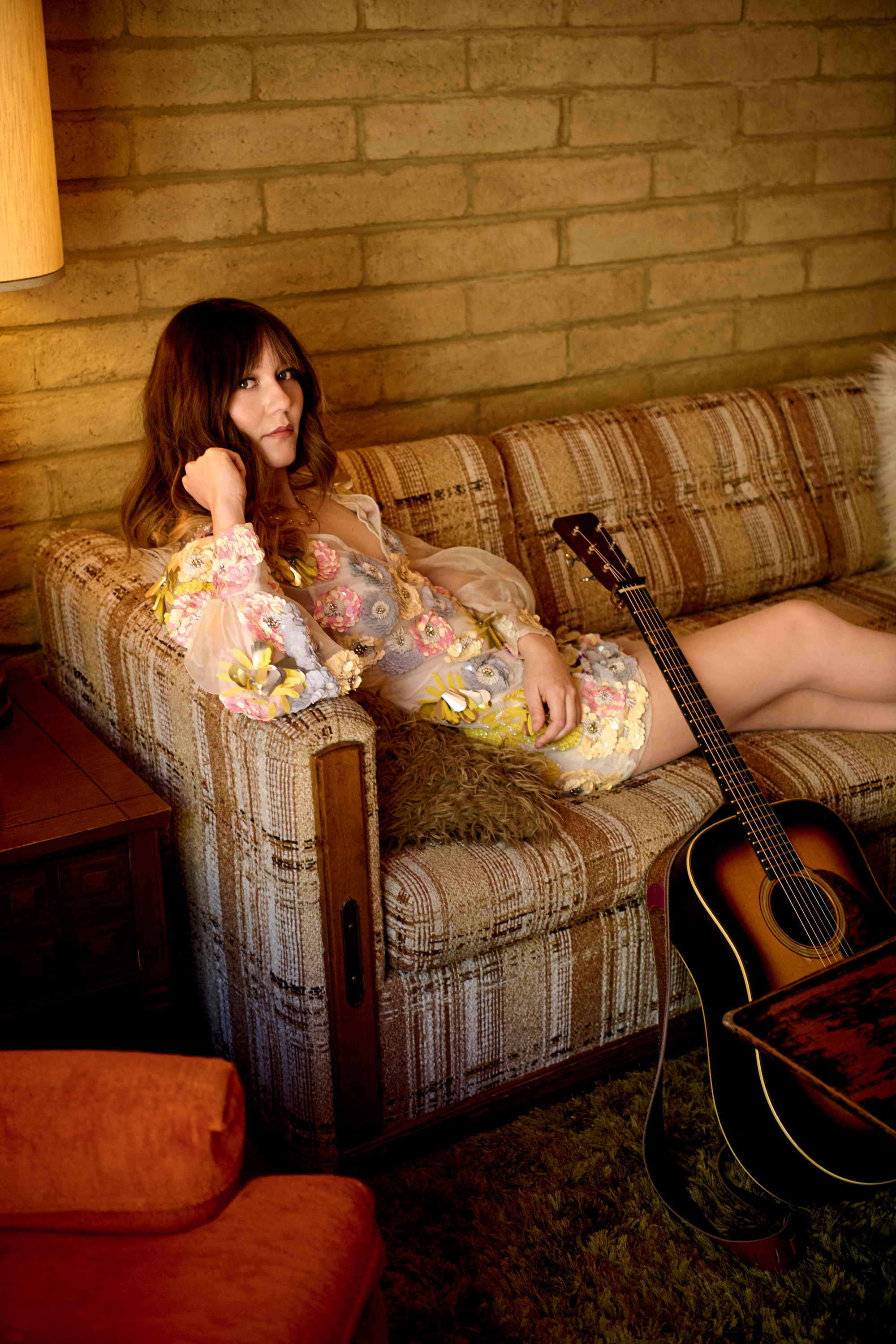
Photo: PETER YANG
Tuttle and Golden Highway’s Down the Rabbit Hole tour continues through mid-September.
Touring, even as friends, requires Golden Highway to hone their listening skills and have a high level of self-awareness, onstage and off. They performed ninety-nine shows last year, and Keith-Hynes says no snags have arisen so far, in part because they all genuinely like one another, and in part because of Tuttle’s calm leadership. “She’s really good at recognizing the strengths of every band member and utilizing that in the group,” Keith-Hynes says. “She sort of brings out the best in all of us.”
Along the way, the curve of Tuttle’s career has continued straight up. In 2021, Béla Fleck asked her to perform on “My Bluegrass Heart.” Last year, she played for Jimmy Kimmel and sat in on sets with Dave Matthews and Tim Reynolds. When Tuttle then asked Matthews to appear on City of Gold, he agreed almost immediately, lending his vocals to “Yosemite.” “She’s a musician’s musician,” Matthews writes of Tuttle in an email. “It’s undeniable. What does a rocking horse say to a Pegasus? That’s what I say to Molly.”
Most important, over the past few years Tuttle has integrated her fullest and most authentic self—all of it—into her music, leading to some of the boldest songs of her career. After Roe v. Wade was overturned, she wrote a song called “Goodbye, Mary,” about the deadly struggle for bodily autonomy that women in previous generations faced. “She doesn’t shy away from things,” says Douglas, her coproducer.
Tucked into a couch in the dim light of Nashville’s Soho House club last spring, Tuttle doesn’t seem fazed by everything she has accomplished since those first years of couch surfing, teaching, and relentless gigging. She remains warm and courteous and quick to laugh. She may still be a little shy, but she knows who she is—and aims to share that feeling.
“I want people who come to my shows to feel free to be who they are,” she says, calling music “this safe space for all of us to have a positive experience together, feel part of something bigger than ourselves, and also feel comfortable in our own skin.”
Though it took her years to accept and embrace her alopecia, Tuttle has now become an ambassador for the National Alopecia Areata Foundation and an outspoken advocate for others living with the condition. Opening up about it has brought a new sense of peace. “The reaction was so positive,” she says, and “that just gave me the encouragement to keep going.”
Tuttle still enjoys wearing wigs, which she matches to her moods and eclectic sense of style, just like any other accessories, but gone are the days when she felt she was hiding under them. That much became evident near the end of the Tuck Fest set.
After Tuttle and her band’s wild romp through her genre-bending bluegrass Wonderland, the front woman walked to center stage and started strumming a few chords. “There’s a lot of things in my life that have made me feel different than other people,” she said. “Sometimes I felt like I didn’t belong, and one of those things was when I was a little kid, and I lost all my hair from something called alopecia.” She picked out the opening riff of “Crooked Tree.”
“Since it’s kind of humid tonight, and my hair’s looking pretty frizzy,” she continued, “I’m just going to have a little…costume change.” As she lifted off her wig, she was greeted by a tidal wave of cheers and applause—the complete acceptance of an artist willing to be her most vulnerable.
Molly Tuttle smiled. “This is for all the crooked trees out there.”


